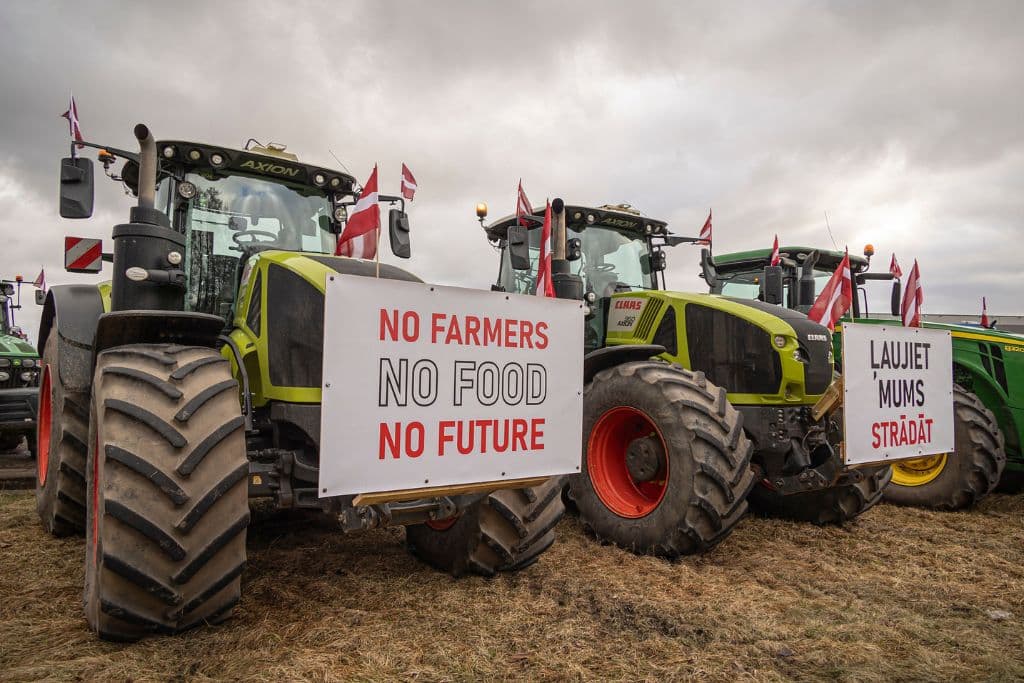The Commission reassured it is not weakening its environmental ambitions but is simplifying some sustainability requirements in light of months-long farmers protests.
—
The European Union on Wednesday overwhelmingly voted to exit a highly disputed international treaty on energy investments that has recently been used by fossil fuel companies to challenge EU governments over green policies.
Lawmakers also approved weakened green legislation targeted at the agricultural sector, following months of dispute and protests from farmers worried that the sustainability requirements would decrease competitiveness with countries that have less stringent environmental regulations.
Energy Treaty
With 560 votes in favour and 43 against, MEPs overwhelmingly consented to the EU exiting the Energy Charter Treaty (ECT), a multilateral agreement established in 1994 to facilitate trade and investment in the energy sector. Largely unchanged since its adoption, the treaty is now viewed by many as outdated and as favouring investments in fossil fuels that are no longer compatible with the EU’s climate targets under the European Green Deal and the 2015 Paris Agreement.
Speaking in November 2023, Belgian energy minister Tinne van der Straeten said, “We need treaties that serve our people and climate, not the fossil fuel industry.”
In recent years, some European countries have been taken to court under the treaty by fossil fuel companies claiming that these countries’ green legislation is undermining their investments. In 2022, Italy was ordered to pay British oil company Rockhopper €250 million (US$268 million) in compensation for implementing an offshore oil drilling ban. Last year, Jersey-based oil-refining company Klesch Group Holdings Limited sued the EU, Germany, and Denmark for at least €95 million over windfall taxes.
“In view of the climate crisis, the EU must become a climate-neutral continent as quickly as possible. Finally the fossil dinosaur treaty is no longer standing in the way of consistent climate protection, as we no longer have to fear corporate lawsuits demanding billions of euro in compensation brought before private arbitration tribunals,” said Anna Cavazzini, Rapporteur for the Trade Committee.
The resolution is now in the hands of the European Council, which can adopt it by qualified majority.
Sustainable Agriculture
On Wednesday, the Parliament also approved a series of weakened environmental requirements linked to the disbursement of tens of billions of euros in subsidies for European farmers.
In February, the European Commission announced it would delay a key agricultural policy originally intended to require all farmers to set aside 4% of their land to support biodiversity and promote healthy soil. Aside from exempting all farmers from the requirement, the Commission also said that farmers growing certain environmentally friendly crops on at least 7% of their arable land will be regarded as fulfilling the requirement. These include crops that contribute to nitrogen fixation – such as lentils, peas, and favas – as well as catch crops – quick-growing crops planted between the main crops that maximise land use while preventing soil erosion.
The requirement is part of the bloc’s highly contested €55 billion (US$59.4) Common Agricultural Policy (CAP), the EU’s oldest and costliest policy that implements a system of agricultural subsidies and other programmes.

Farmers are facing unprecedented challenges as a result of geopolitical tensions and climate change. In particular, back-to-back extreme weather events including droughts, wildfires, and floodings in various European countries have impacted output and revenue, while Russia’s invasion of Ukraine in 2022 contributed to a spike in energy and input prices and affected trade flows. The price of cereals is currently about 30% lower than pre-invasion, from €80.6 billion (US$87.1 billion) in 2022 to €58.8 billion (US$63.5 billion) in 2023. For months, European farmers have been protesting the new green rules, arguing that they will decrease competitiveness with countries that have less stringent environmental regulations.
More on the topic: Explainer: Why Are European Farmers Protesting?
This story is funded by readers like you
Our non-profit newsroom provides climate coverage free of charge and advertising. Your one-off or monthly donations play a crucial role in supporting our operations, expanding our reach, and maintaining our editorial independence.
About EO | Mission Statement | Impact & Reach | Write for us


















